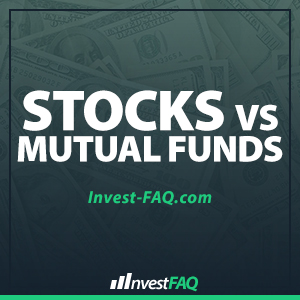This article discusses the relative advantages of holding individual stocks compared to mutual funds. Question: What advantages do mutual funds offer over stocks? Here are some considerations. A mutual fund offers a great deal of diversification starting with the very first dollar invested, because a mutual fund may own tens or hundreds of different securities.
Category: Mutual Funds
Mutual Fund Types
This article lists the most common investment fund types. A type of fund is typically characterized by its investment strategy (i.e., its goals). For example, a fund manager might set a goal of generating income, or growing the capital, or just about anything. (Of course they don’t usually set a goal of losing money, even
What is a Stock Redemption?
On the stock markets, every time someone sells a share, someone buys it, or in other words, equal numbers of opposing bets on the future are placed each day. However, in the case of open-end mutual funds, every dollar redeemed in a day isn’t necessarily replaced by an invested dollar, and every dollar invested in
Mutual Fund Prospectus
Ok, so you just went to a mutual fund family’s (e.g., Fidelity) web site and requested your first prospectus. As you anxiously wait for it to arrive in the mail, you start to wonder what information will be in it and how you’ll manage to understand it. Understanding a prospectus is crucial to investing in
What are Money-Market Funds?
A money-market fund (MMF) is a mutual fund, although a very special type of one. The goal of a money-market fund is to preserve principal while yielding a modest return. These funds try very, very, very hard to maintain a net asset value (NAV) of exactly $1.00. Basically, the companies try to make these feel
What are Index Funds?
This article discusses index funds and modern portfolio theory (MPT) as espoused by Burton Malkiel, but first makes a digression into the topic of “beating the market.” Investors and prospective investors regularly encounter the phrase “beating the market” or sometimes “beating the S&P 500.” What does this mean? Somehow I’m reminded of the way Garrison
Mutual Fund Fees and Expenses
Investors who put money into a mutual fund gain the benefits of a professional investment management company. Like any professional, using an investment manager results in some costs. These costs are recovered from a mutual fund’s investors either through sales charges or operation expenses. Sales charges for an open-end mutual fund include front-end loads and back-end loads (redemption
Mutual Fund Distribution Tax Effects
This article gives a brief summary of the issues surrounding distributions made by mutual funds, the tax liability of shareholders who receive these distributions, and the consequences of buying or selling shares of a mutual fund shortly before or after such a distribution. Investment management companies (i.e., mutual funds) periodically distribute money to their shareholders
Brokers vs Fund Companies
Buying from Brokers versus Fund Companies Many discount brokerage houses now offer their clients the option of purchasing shares in mutual funds directly from the brokerage house. Even better, most of these brokers don’t charge any load or fees if a client buys a no-load fund. There are a few advantages and disadvantages of doing
Average Annual Return
The average annual return for a mutual fund is stated after expenses. The expenses include fund management fees, 12b-1 fees (if applicable), etc., all of which are a part of the fund’s expense ratio. Average annual returns are also factored for any reinvested dividend and capital gain distributions. To compute this number, the annual returns for a










